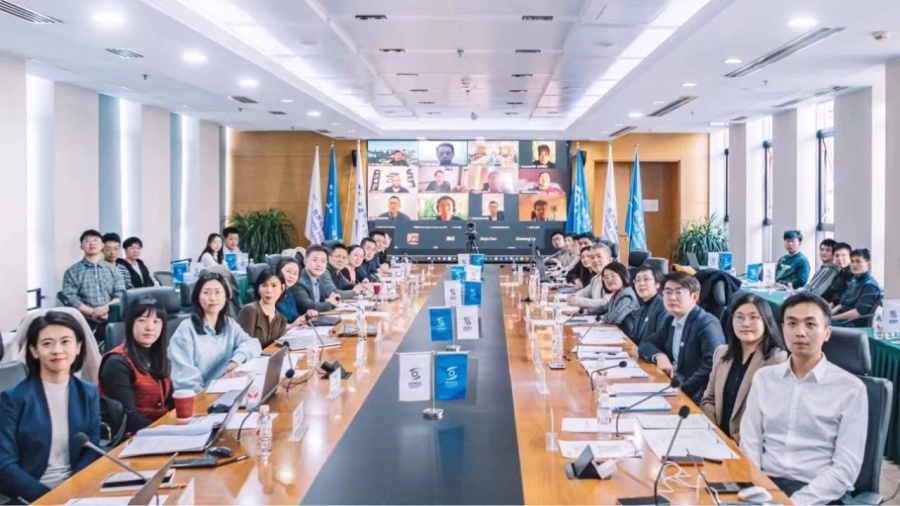
- Home
- Media Center
-
Events
- Wuzhen Summit
- Regional Forums
- Practice Cases of Jointly Building a Community with a Shared Future in Cyberspace
- World Internet Conference Awards for Pioneering Science and Technology
- The Light of Internet Expo
- Straight to Wuzhen Competition
- Global Youth Leadership Program
- WIC Distinguished Contribution Award
- Membership
- Research & Cooperation
- Digital Academy
-
Reports
- Collection of cases on Jointly Building a Community with a Shared Future in Cyberspace
- Collection of Shortlisted Achievements of World Internet Conference Awards for Pioneering Science and Technology
- Reports on Artificial Intelligence
- Reports on Cross—Border E—Commerce
- Reports on Data
- Outcomes of Think Tank Cooperation Program
- Series on Sovereignty in Cyberspace Theory and Practice
- Other Achievements
- About WIC
- 中文 | EN

WIC hosts seminar on global AI governance
The AI Safety and Governance Program of the World Internet Conference (WIC) hosted a seminar in Beijing on Thursday, focusing on the Artificial Intelligence Governance for Good and for All—Empowering Global Sustainable Development.

Organized by the Specialized Committee on Artificial Intelligence, the seminar centered around a research report of the same title, which is scheduled for official release at the upcoming WIC Asia-Pacific Summit held in Hong Kong in April.
More than 30 experts and scholars from international organizations, universities, think tanks, and leading enterprises in the AI sector joined in the event, either in person or online, to exchange views and provide feedback on the draft report.
The seminar was chaired by Zeng Yi, co-chair of the WIC Specialized Committee on AI, co-lead of the AI Safety and Governance Program, and director of the International Research Center for AI Ethics and Governance at the Institute of Automation, Chinese Academy of Sciences.
Seán Ó hÉigeartaigh, co-lead of the AI Safety and Governance Program of the WIC Specialized Committee on AI, and director of the AI: Futures and Responsibility Programme at the University of Cambridge, delivered the closing remarks.
Zeng introduced the progress of the joint research on Governing AI for Good and for All—Empowering Global Sustainable Development and the draft report. The report, beased on a comprehensive analysis of the current state, challenges, and future prospects of AI-powered sustainable development, provides in-depth analysis and elaboration on several aspects, including deepening AI governance and international cooperation, expanding international cooperation in AI capacity-building, and bridging the digital divide through inclusive and equitable AI development.
As an extension of WIC’s AI for Good initiative, the report compiles more than 30 global case studies, showcasing practice reference of AI in driving sustainability.
Experts from China Mobile Research Institute, Tencent Foundation, Lenovo Group, and the Arab ICT Organization shared insights into AI governance and sustainability through real-world applications, including the Jiutian Medical Emergency AI Model for rural healthcare, the Wildlife Friend Program for biodiversity conservation, Lenovo’s AI Science Museum supporting rural sustainability, and AI-driven initiatives to empower female leadership in the Arab world.
In the discussion session, participants from the UNESCO Regional Office for East Asia, the United Nations University Institute in Macau, the Advisory Council on AI of the Ministry of Higher Education, Science and Innovation, Uzbekistan, the Chinese University of Hong Kong, Tsinghua University, Sri Lanka CERT, the Cyber Security Association of China, China Internet Network Information Center, MiniMax, and the Fuxi Institution contributed valuable input to the report.
Participants provided constructive feedback on topics such as AI’s role in advancing sustainable development, international cooperation in AI capacity-building, and bridging the digital divide. Members of the AI Safety and Governance Program also submitted written recommendations to further refine the report.
Experts at the seminar commended the report for its comprehensive examination of AI governance, its opportunities and challenges, and its emphasis on international collaboration in AI capacity-building for sustainable development. They underscored the importance of aligning the report with evolving technologies and policy trends and deepening its exploration of key governance challenges. The findings, they noted, will play a crucial role in shaping AI’s broader impact on human society.
A WIC representative said the report was the first major outcome of the WIC Specialized Committee on AI since its establishment. The final version, incorporating expert feedback, will be officially released at the WIC Asia-Pacific Summit.

The World Internet Conference (WIC) was established as an international organization on July 12, 2022, headquartered in Beijing, China. It was jointly initiated by Global System for Mobile Communication Association (GSMA), National Computer Network Emergency Response Technical Team/Coordination Center of China (CNCERT), China Internet Network Information Center (CNNIC), Alibaba Group, Tencent, and Zhijiang Lab.





